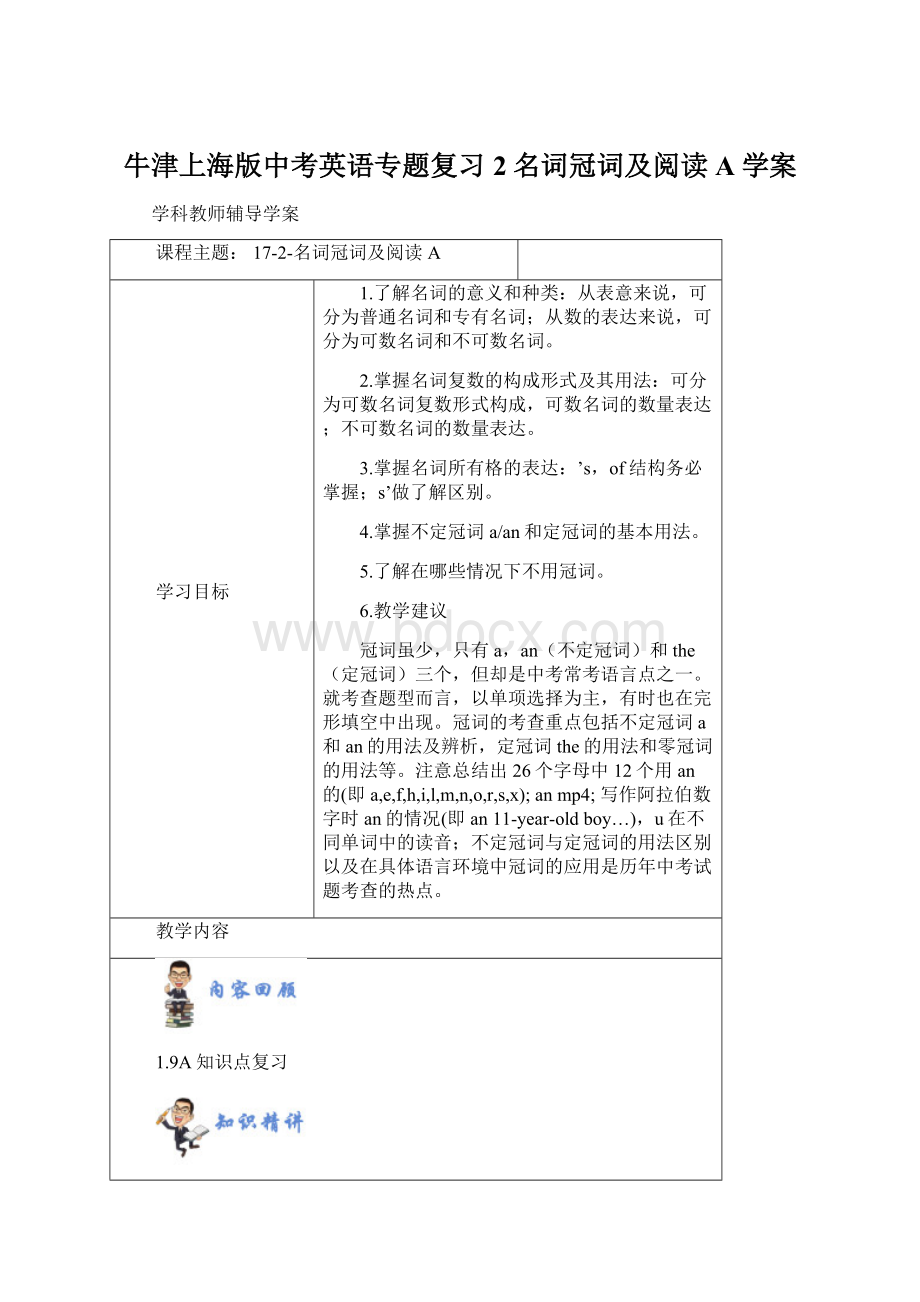牛津上海版中考英语专题复习2名词冠词及阅读A学案.docx
《牛津上海版中考英语专题复习2名词冠词及阅读A学案.docx》由会员分享,可在线阅读,更多相关《牛津上海版中考英语专题复习2名词冠词及阅读A学案.docx(18页珍藏版)》请在冰豆网上搜索。

牛津上海版中考英语专题复习2名词冠词及阅读A学案
学科教师辅导学案
课程主题:
17-2-名词冠词及阅读A
学习目标
1.了解名词的意义和种类:
从表意来说,可分为普通名词和专有名词;从数的表达来说,可分为可数名词和不可数名词。
2.掌握名词复数的构成形式及其用法:
可分为可数名词复数形式构成,可数名词的数量表达;不可数名词的数量表达。
3.掌握名词所有格的表达:
’s,of结构务必掌握;s’做了解区别。
4.掌握不定冠词a/an和定冠词的基本用法。
5.了解在哪些情况下不用冠词。
6.教学建议
冠词虽少,只有a,an(不定冠词)和the(定冠词)三个,但却是中考常考语言点之一。
就考查题型而言,以单项选择为主,有时也在完形填空中出现。
冠词的考查重点包括不定冠词a和an的用法及辨析,定冠词the的用法和零冠词的用法等。
注意总结出26个字母中12个用an的(即a,e,f,h,i,l,m,n,o,r,s,x);anmp4;写作阿拉伯数字时an的情况(即an11-year-oldboy…),u在不同单词中的读音;不定冠词与定冠词的用法区别以及在具体语言环境中冠词的应用是历年中考试题考查的热点。
教学内容
1.9A知识点复习
一.名词
【知识梳理】
1.专有名词和普通名词
(1)专有名词表示特定的或者独无二的人或物,如人名、地名、机构名称等。
1)专有名词的首字母要大写,如China,Africa,Mr.Green。
2)一般的人名、地名通常不带定冠词,但河流、海洋、群岛、海峡等名称带定冠词,如:
thePacificOcean,theEnglishChannel。
3)某些由普通名词组成的专有名词也带定冠词,如,theGreatWall,theChildren’sPalace,thePeople’sPark,theChineseNewYear,theUnitedStatesofAmerica。
4)专有名词一般没有复数形式,但表示姓的专有名词变成复数时,指该姓的一家人,前面必须加定冠词,如:
theGreens,theSmiths,theWangs。
(2)普通名词表示一类人、物或事,可以分为个体名词、集体名词、物质名词和抽象名词。
1)个体名词指人或物的个体,是可数名词。
2)集体名词是一群人或物的总称,有些是可数名词,有些是不可数名词。
如:
可数名词:
aclass—twoclassesateam—twoteams
不可数名词:
furnitureequipment
3)物质名词表示不能分为个体的物质,多数是不可数名词。
4)抽象名词表示人或物的品质、状态等抽象概念,多数是不可数名词。
如:
advice,progress,happiness,information。
2.名词的数量表达
(1)可数名词的数量表达
many,afew,some,alargenumberof,hundredsof,agreatmany等可修饰可数名词,且可数名词与表示计量的名词连用时,两部分都要用复数。
如:
Manytimes,afewfriends,somecomputers,threeboxesofeggs
(2)不可数名词的数量表达
much,alittle,some,ahugeamountof,plentyof,agreatdealof等可以修饰不可数名词,不可数名词没有复数形式,不能和冠词a/an或数词连用,表示数量时要与表示计量的名词连用。
如:
muchtime,alittlefood,somegoodnews,threebowlsofrice
3.名词的所有格
名词所有格是指一个名词与另一个名词之间存在所有关系时所用的形式。
其构成有两种:
一种是由名词末尾加’s构成;另一种由介词of加名词构成。
前者多用来表示有生命的东西;后者多用来表示无生命的东西。
例如:
Children’sPalace少年宫
Tom’sbike汤姆的自行车
thetitleofthebook书名
thelegsofthetable桌子的腿
名词所有格的构成有以下几种情况:
(1)表示生命的东西(人或动物)的名词所有格,一般在名词后加's来表示。
如:
theboy'smother,mymother'sfather,Mary'sbirthday
(2)词尾是s或es的复数名词所有格,只加'来表示。
如:
theteachers'office,tenminutes'walk
(3)词尾没有s的复数名词则加's来表示所有格。
如:
Children’sDay,Women’sDay,thepeople'sneeds
(4)如果一样东西为两人共有,则在后一个词的词尾+'s,如果你共有,则在两个名词的后面都+'s。
如:
ThisisLucyandLily'sbedroom.TheseareLucy'sandLily'sbedrooms.
(5)有一些指时间、距离、世界、国家、星球、城镇等无生命的名词,也可以用's表所有格。
如:
today'snewspaper,amile'sdistance,Shanghai'sproducts。
(6)如果是复合名词,所有格的词尾要加在后面的名词上。
如:
Thisisherson-in-law'sphoto.
Itmustbesomebodyelse’spen.
注意:
A)名词所有格后面指地点(如表示店铺、人家)的名词常常可以省去。
如:
atthetailor's(shop),atMrGreen's(home)
B)名词所有格所修饰的词,如果前面已经提到,往往省略。
如:
Thisball-pointpenisnotmine.It'smysister's.
C)名词有较长的定语时,不宜用’s,要用of短语表示所属关系。
如:
Iknowthenameoftheprofessorwhoisstandingthere.
D)名词前面有冠词、数词、不定代词或者指示代词(a,two,some,any,this,etc.)时,常用短语加名词所有格来表示。
【例题精讲】
例1.WewenttoDr.Brown'syesterday.Hegaveus_____.
A.someadvice
B.advices
C.anadvice
D.someadvices
例2.--Mike,whatclubdoyouwanttojoin?
--Well,Iwanttojointhe_____club.Ilikepainting.
A.art
B.music
C.art
D.sports
例3.--AreyougoingoutwithJadetonight?
--That'smy_____.Mindyourown!
A.offer
B.business
C.question
D.thing
例4.--Couldyoushowmethemethodofcookingthetastycookies?
--Pleasefollowthe_____onthecookbook.
A.instruction
B.direction
C.introduction
D.decision
【课堂练习】
1.Lifeislikeridingabicycle.Tokeepyour_____,youmustkeepmoving.
A.balance
B.promise
C.position
D.relationship
2.--It'susefulforthedeafpeopletolearnsignlanguage.
--Yes,it'samajorwayof_____forthem.
A.suggestion
B.vacation
C.communication
D.translation
3.Hehasmuch_____asanengineer,sohecanbuildthebridgesuccessfully.
A.balance
B.experience
C.surface
D.market
4.--DoyouknowaboutthescientistTuYouyou?
--Yes.Shewonthe2019NobilePrizeinmedicinebecauseofhergreat_____.
A.surprise
B.achievement
C.education
D.intelligence
5.Billwillbea/an_____tointerviewthefootballplayersinthecomingRio2019Olympics.
A.guest
B.reporter
C.tourist
D.interviewee
二.冠词
【知识梳理】
1.冠词的意义
冠词是一种虚词,放在名词的前面,帮助说明名词的含义。
英语中的冠词有两种:
不定冠词a/an和定冠词the。
a/an是“一个”的意思,a一般读作/ə/,an读作/ən/,在特别强调或单个朗读时,它们可读作/ei/,/æn/。
the在辅音前读/ðə/,在元音前渎/ði/,在特别强调或单个朗读时,读作/6i:
/,有“那(这)个”的意思。
【例题精讲】
例1.—Howlongis___quarterofabasketballmatchinNBA?
—It’susuallytwelveminuteslongandbetween____secondandthirdquartersthereisaten-minutebreak.
A.the;the
B.a;the
C.a;a
D.the;a
例2.Atprimaryschool,Idreamedofbeing_____astronaut.
A.a
B.an
C.the
D./
例3.Jacklikesplaying_______soccer,buthedoesn’tlikeplaying_____piano.
A./,/
B.the,/
C.the,the
D./,the
例4.Itis________usefuldictionary.
A.a
B.an
C.the
D./
例5.—WhatdoesMichaellooklike?
—Hehasbigeyesand________widemouth.
A.a
B.an
C.the
D./
【课堂练习】
1.OnJuly15,2019________earthquakehitWenchuan,SichuanProvince.
A.an
B.a
C./
D.the
2.“Cindy,doyouhave________emailaddress?
Iwanttosendyousomephotos.”
“Yes,Ido.It's.”
A.a
B.an
C.the
D./
3.Asweknow,Englandis________EuropeancountryandSingaporeis________Asiancountry.
A.an;an
B.an;a
C.a;a
D.a;an
4.—Whatdoyouwanttobeinthefuture,Nick?
—Iwanttobe________pilot.Itis________excitingjob.
A.a;a
B.a;an
C.the;an
D.a;the
5.It'snot________goodideatodriveforfourhourswithout________break.
A.a;a
B.a;the
C.the;a
D.the;the
三.(总)知识梳理
【知识梳理】
1.阅读理解概述
中考阅读理解题主要考查考生对单词、词组、语法、句型、习惯用法的综合运用及其英语思维的能力。
要求考生能不借助词典阅读含有3%生词的多种文体的语言材料,阅读速度为每分钟50-70个词。
近年中考英语的阅读理解文章基本都是从原版书或杂志上节选,题材丰富,体裁各异,有报道、有故事、有评论、有科普文章、还有旅游广告等。
从阅读文章的体例来看一般有说明文和记叙文,对说明文,要抓住文章所提供的信息做出分析、判断或选择,然后做出结论;对于记叙文,应力求弄清文中提及的人或物、时间、地点、事件和原因等要点,总结全文的中心思想。
2.常见考查方式
3.常见题型及解题方法——细节题(又称事实询问题)
常见提问方式:
以what,who,which,when,where,how或why等词引导,就文中某句、某段或某一具体细节提问。
如:
Therewasoncealarge,fatwomanwhohadasmall,thinhusband.HehadajobinabigcompanyandwasgivenhisweeklypayeveryFridayevening..AssoonashegothomeonFridays,hiswifeusedtomakehimgiveherallhismoney,andthensheusedtogivehimbackonlyenoughtobuyhislunchintheofficeeveryday.
()Howmuchmoneywasthehusbandallowedtokeepeveryday?
A.Justenoughtobuychocolates.
B.Justenoughtobuyasandwich.
C.Justenoughtobuyhi.slunchinarestaurant.
D.Justenoughtobuyhislunchintheoffice.
筒析:
这是一道典型的细节题,因为它的答案可以直接从文段中找到。
根据这段最后一句话,可以得知D为正确答案。
细节题解题方法:
1)明确题意,找出题目中与细节有关的一个或者多个关键词(主要是一些实词),比如,本题中的关键词可以定位为money,husband,keep。
2)带着关键词,回到文中进行定位。
由关键词money,可将答案定位在文段的最后一句。
3)阅读该句,查找答案。
如果没有找到答案,在上一句或者下一句中寻找,一般就能找到答案。
4.常见题型及解题方法——推断题
常见提问方式:
Whatcanyouconclude(下结论)fromthispassage?
What'stheauthor'sattitude(态度)towards…?
Whichstatementis(not)true?
做这类题要求考生在阅读的同时.抓住文章的主题和细节,分析文章结构,根据上下文
内在联系,挖掘文章的深层含义。
其次,对于暗含在文章中的人物的行为动机、事件中的因
果关系及作者未言明的倾向、意图、态度、观点等要进行合乎逻辑的判断、推理、分析,进一步加强理解,抓住实质性的东西。
如:
Aman,dressedasacountryman.waswalkingalongthestreetofalargecity.Hewascarryingasmallparcel.Itwaswrappedupcarefully.Ithadanameandanaddressonit.Therewasalsosomewritingwhichsaidithadl,000-dollarsinside.Thecountrymanwaslookingthiswayandthat.Hewascertainlylookingforthehousewherehehadtoputtheparcel.
Astranger,passingby,askedhimwhathewaslookingfor.Thecountrymanshowedhisparcel.Heaskedhimtoreadtheaddressonit.“Ihaveforgottenit,”hesaid.“AndIdon'tknowhowtoread.'”“Why!
”saidthestranger,“That'smynameandaddress.It'smyparcel.It'sfrommyoldfriend,Bob.Hepromisedtosendittomeaweekago.”
Thecountrymanlookedpleasedtohearthis.“Takeitifit'syours,”hesaid.“Butyoumustgivemesixtydollarsformytrouble.”Thestrangerdidso.Thecountrymanthengotonapassingbus.Thestrangerwenttoaquietcornertolookattheparcel.Insideit,therewasnothingbutsomepiecesoftorncloth.
()What'sthefeelingofthestranger?
A,Angry.BRegretful.eBad.nSurprised.
简析:
这是一个推理判断题,它要求学生对文章进行仔细分析,才能做出合理判断。
看完文章后知道文中的stranger拿了60美元换回了一个装满破布的包裹。
当他看到这些破布时,他马上意识到他没有骗到“乡下人”的钱,反而被“乡下人”骗了,他那时一定非常生气,对自己的行为感到后悔,如选B,那么没有理解文章的意思。
如选C或D,虽然也略微表达了一点stranger的心理状态,但毕竟没有A那么贴切。
【例题精讲】
例1.Astronautshavealreadyvisitedthemoonandlivedonspacestations.They'veneverbeentoanotherplanetsofar,butbytheyear2100,theymightliveontheplanet—Mars.Theastronautswillspendaboutsixmonthstravelingtotheplanet,thenabouttwoyearsontheplanetandaboutsixmonthstravelingbacktotheearth.They'llbeawayfromtheearthforaboutthreeyears,sothey'llneedalotoffood!
It'sveryexpensivetotakefoodintospace.Itcostsabout120,000dollarstocarrysomethingthatweighsonekilogram.SoanappleonMarscouldcost20,000dollars!
Ofcourse,theywillneedtotakequitealotoffoodwiththemtofeedtheastronautsforthreeyears.Thisamountoffreshfoodcannotstayfresh,andisveryexpensivetotake,sotheyneedtofindfoodthatisnotveryheavy.
Atthemoment,astronautsonspacestationseatdriedfood.It'sverylight,soitdoesn'tcostalotofmoneytocarryitintospace.Butastronautsstayhealthierandhappieriftheyeatfreshfood.Inthefuture,astronautsonMarsmaygrowvegetableslikelettuce,spinachandcarrots.
AstronautsonMarswillprobablyhavespecialmachines.TheyMlusethesemachinestochangebeansintofoodsthattastelikemeatorcheesebecauseitwon'tbepossibletokeepanimalsinspace.
LifeonMarswillbebetterthanthatonEarthinmanyways.Peoplewillhavemorespace.Livinginalargebuildingwithonly10bedroomsishighlypossible.Manypeoplebelievethatrobotwilldomostofourwork,sowehavemoretimeforourhobbies.
(1)Accordingtothetext,bytheyear2100,someofuswillpossiblylive
__________.
A.onthemoonB.onMars
C.inthesunD.underthesea
(2)Whydotheastronautshavetoeatdriedfood
_____